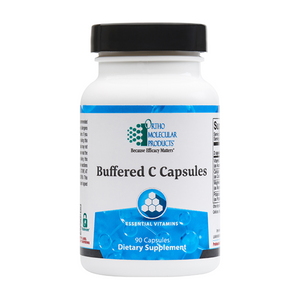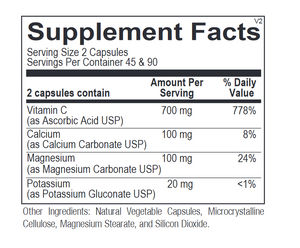

Buffered C Capsules, 90 caps
DESCRIPTION
Buffered C allows for higher doses of vitamin C, a critical component of immune health and an important antioxidant in the body. Buffered C capsules are balanced with calcium, magnesium and potassium to gently deliver high-concentration vitamin C with reduced gastrointestinal upset.
- High-Concentration Vitamin C Formula
- Buffered with Minerals to Prevent Potential Stomach Upset
- Boosts Immune System Function and Antioxidant Reserve
- Helps Combat Free Radical Damage
- Promotes a Healthy Cycle of Inflammation
- Promotes Collagen Formation to Maintain Healthy Ligaments, Tendons, and Joints
INGREDIENTS
Serving Size: 2 capsules
Servings per Container: 45
Ingredients:
- Vitamin C(as Ascorbic Acid USP)
- Calcium(as Calcium Carbonate USP)
- Magnesium(as Magnesium Carbonate USP)
- Potassium(as Potassium Gluconate USP)
Other Ingredients: Natural Vegetable Capsules, Microcrystalline Cellulose, Magnesium Stearate, and Silicon
Formulated to be free of allergens derived from: Gluten, corn, yeast, artificial colors and flavors.
DIRECTIONS
Suggested Use: 2 or more capsules per day or as recommended by your health care professional.
If you are pregnant or nursing, consult your physician before taking this product.
Keep container tightly closed. Store at room temperature. Keep out of reach of children.
LEARN MORE
Vitamin C is a water-soluble vitamin most widely known for its role in supporting immune health. It provides potent antioxidant protection, as it helps combat cellular damage from free radicals caused by oxidative stress, thus protecting health overall. Vitamin C also boosts the function of immune cells and is a key nutrient in the synthesis of collagen. Buffered C Capsules are balanced with calcium, magnesium and potassium to gently deliver high-concentration vitamin C to reduce the potential of gastrointestinal upset.
Overview
Vitamin C’s role in immune enhancement has been strongly evidenced in supplementation research to increase natural killer cell activity, lymphocyte proliferation and immune balance. Vitamin C is also a potent antioxidant, acting to neutralize free radical damage to cells, including DNA, lipids and proteins. As a free radical neutralizing agent, vitamin C readily donates electrons to unstable molecules and breaks the chain of free radical damage to cells and tissues. Vitamin C is also involved in the synthesis of collagen, carnitine and neurotransmitters. The vitamin is considered essential to humans, and while most mammals are able to synthesize vitamin C, humans cannot. As a result, exposure to smoke, pollution, radiation, heavy metal exposure and high-stress lifestyles all increase the body’s requirement for vitamin C.
Deficiency
Severe vitamin C deficiency has been known for many centuries as scurvy, a condition characterized by subcutaneous bleeding, poor wound closure, bruising easily, hair and tooth loss and joint pain or swelling. While scurvy is rare in the majority of today’s population, current lifestyle factors raise the requirement for vitamin C. Adequate intake and retention is necessary to maintain healthy vitamin C status in the body.
Cardiovascular Health
Research has shown vitamin C to have a strong relationship with cardiovascular health. In 2004, a pooled analysis of nine prospective cohort studies found that supplemental vitamin C intake (>400 mg/day for a mean of 10 years) supported cardiovascular health.5 A meta-analysis of 13 randomized controlled trials (RCTs) assessed the effect of vitamin C supplementation on blood fats6 among 549 subjects, aged 48- 82 years of age. Subjects received vitamin C supplements or placebo at doses ranging from 500 to 2,000 mg/day for 4 to 24 weeks. Overall, vitamin C supplementation had a significant impact on maintaining healthy blood fats. In addition, cross-sectional studies have indicated that plasma vitamin C concentration helps maintain healthy blood pressure levels in both men and women.
Immune Function & Antioxidant Support
Vitamin C supplementation has been studied for more than six decades for its role in supporting the body during immune challenges. It has been shown to stimulate both the production and function of white blood cells, especially neutrophils, lymphocytes and phagocytes. These immune guardians have been shown to accumulate high concentrations of vitamin C, which can protect these cell types from oxidative damage. Through its potent antioxidant functions, vitamin C has been shown to protect white blood cells from self-inflicted oxidative damage.
Connective Tissue Health
Vitamin C’s role in collagen formation makes it vital to maintaining skin, capillary, gum, joint and skeletal health. The antioxidant properties of vitamin C and its role in collagen synthesis make vitamin C vital to skin health. Keratinocytes have a high capacity for vitamin C transport, to compensate for limited blood flow to the epidermis. Vitamin C’s role in normal tissue repair and recovery may include promoting keratinocyte differentiation, stimulating the formation of the epidermal barrier and re-establishing the stratum corneum, the outermost layer of the epidermis. Higher intakes of dietary vitamin C have been correlated with a decreased risk of dry skin.
Statements contained herein have not been evaluated by the Food and Drug Administration. This product is not intended to diagnose, treat, cure, or prevent disease.







